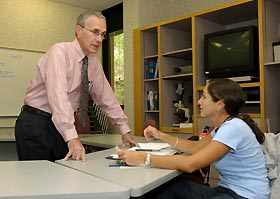|
This is an archived article.
For the latest news, go to the Advance
Homepage
For more archives, go to the Advance Archive/Search Page. |
||
|
Cinti's No-Bells-and-Whistles Style
Earns Students' Acclaim By Pat Keefe
No darkened auditorium. No laser pointers. No PowerPoint presentation. No soundtrack. No slides.
But there's a bang - using only his voice, a blackboard, and a lifetime's preparation. Dominick Cinti, professor of pharmacology, loves to teach. And students love his classes - they voted him winner of this year's Charles N. Loeser Award for Excellence in Teaching in the Basic Medical Sciences. The Loeser Award is presented yearly to a Health Center faculty member by second-year medical and dental students. It is named in memory of anatomy professor Dr. Charles Loeser, and the winner must possess scholarly curiosity; the ability to evoke in students an enthusiasm for learning; and a desire to give whole heartedly of themselves to advance the welfare and education of their students. "There's a joy in teaching, an exhilaration," Cinti says. Education in its most fundamental form is the source of that exhilaration, he says: effective communication between teacher and student that leads not just to learning but to the growth of understanding. "I always put myself in the audience and ask 'Are they understanding the lecture being presented to them?'" says Cinti. "I try to put myself in a student's shoes. 'What are the difficult concepts?' and I make sure I spend some time explaining the concept at a level the student can comprehend." "Dominick Cinti is an exceptional teacher and one I have admired both as a student of his and as a faculty member," says Thomas Manger, an associate professor of medicine, a School of Medicine graduate, and last year's Loeser award winner. "He makes it a point to get to the students' level, not just academically, but personally," Dr. Manger says. "His genuine interest in his students and for what he's teaching comes through quite strongly in his lectures. It's obvious that he really wants to be there and that he values what he does." Gregory Veillette, a third-year medical student, describes Cinti as "phenomenal" at presenting information. "His style is to write it on the board and talk in a way that's easy to follow for people who really have no idea," Veillette says. "He uses simple language to get his point across." He also says Cinti is keenly aware of the classroom dynamic. "He looks at the class and he senses if we're following him," he says. "He'll ask if we got it. And if he sees a couple of blank faces, he'll stop and go over it until everyone's got it." Cinti says that awareness comes from experience. "After a while you get a sense or a feeling of how you've performed in the classroom," he says. "You see it in the faces of the students when you've done well. Unfortunately, you also see it in the faces of the students when you haven't done so well." He does well now, but his teaching career began on a disastrous note. When Cinti joined the faculty in 1973, Robert Volle, the first chair of the Department of Pharmacology, accompanied him to the classroom and observed his first lecture. He later invited Cinti to his office and asked how he had done. Cinti replied he thought he had handled the material well. "That was the worst lecture I ever heard!" Volle said. Despite Cinti's embarrassment, Volle went on to explain what was wrong: the lecture was disorganized, Cinti failed to stress the important concepts, and he didn't use sufficient examples to underscore the important points. The upbraiding was the start of something great. "I took his words to heart and really worked on my teaching," Cinti says. "Bob Volle played a major part in my winning this award." In 1992, the thought, effort, preparation and classroom experience of nearly two decades paid off, when Cinti won the Loeser award. Now, 10 years later, he has been honored a second time. Cinti continues to strive to perfect his art. And it shows in the classroom. Brent Martineau, a third-year medical student, says Cinti understands the challenges of learning and comprehending new material. "He approaches every concept in a logical manner and simplifies it into what you need to know," Martineau says. "Many instructors give you so much detail you get lost in it," he adds. "Professor Cinti does a good job of helping you to learn long-term. You remember what you need to know." |
 hen Dominick Cinti lectures on general pathology and
pharmacology in Mechanisms of Disease, a 30-week, eight-section
course bringing Phase 1, the first and second years of medical and
dental school to a close, there isn't much flash.
hen Dominick Cinti lectures on general pathology and
pharmacology in Mechanisms of Disease, a 30-week, eight-section
course bringing Phase 1, the first and second years of medical and
dental school to a close, there isn't much flash.
